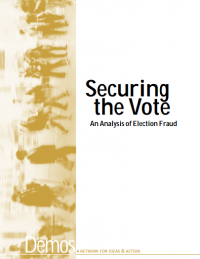An in-depth study of election fraud issues and the policy requirements of the Help America Vote Act.
Executive Summary
Election fraud is a hotly contested topic in public debates about electoral reform. Debates over election fraud are not new. They have been a staple part of discussions about elections and democracy in the United States for more than a century. But in recent years, issues of fraud and voting integrity have increasingly come to the forefront of public policy discussions over the health of America's democracy.
Since the 2000 election, a historic effort has been underway to strengthen voting systems across the 50 U.S. states and also to address obstacles to broader electoral participation. However, at both the federal and state level, efforts to move forward a reform agenda have frequently been complicated by heated debates over issues of election fraud and the integrity of voting systems.
In Congress, disagreement over voter identification provisions in federal election reform legislation resulted in an acrimonious legislative process that delayed passage of the Help America Vote Act.
The 2002 election further underscored the salience of the issue in U.S. electoral politics. With control of the U.S. Senate hanging on the outcome of at least eight Senate races too close to call, the integrity of all ballots was viewed as a matter of grave importance. Allegations of fraudulent registration and balloting, as well as voter intimidation, were made in a number of states.
Opponents of efforts to make voting easier and more accessible often cite the potential for election fraud as a reason to oppose reforms, such as election day registration, aimed at addressing one of the most challenging issues facing our electoral system: low voter turnout.
As federal and state officials consider future reform efforts, as well as the merits of existing reforms, and begin implementing the new Help America Vote Act, there is an acute need for better information and analysis about election fraud issues.
Yet to date there have been no major studies of election fraud in the United States. Too often, hearsay and anecdotal stories are put forth as fact during critical policy deliberations. This research report provides a new foundation of information and analysis to inform public discussions about the integrity of America's electoral system.
